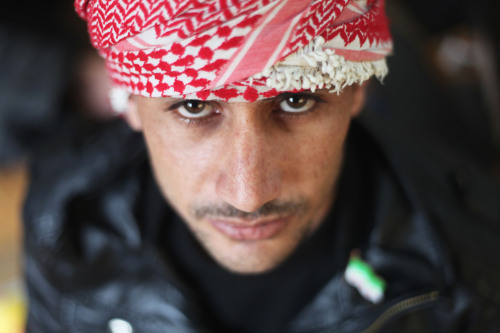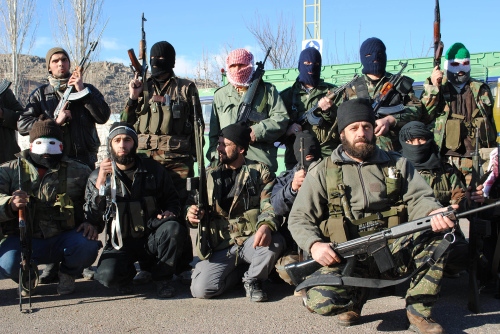At a rented house just outside Syria’s border, a dissident known only as “The Doctor” maps out attacks. Planners speak by Skype with fighters on the ground in Syria, while others raise money, drumming up cash from fellow exiles to buy weapons.
The safe house offers a glimpse into the Free Syrian Army, a group of army defectors and others who are trying to overthrow President Bashar Assad by force.

A motorcycle mechanic from Daraa, Syria, pauses during an interview at a safe house outside Syria, Feb. 9, 2012. (AP)

Syrian army defectors gather at the mountain resort town of Zabadani, Syria, near the Lebanese border, Jan. 20, 2012. (AP)
The FSA has emerged as a significant hope for many Syrians who have all but given up on peaceful resistance against government tanks and snipers waging a deadly crackdown on protesters. But the group is highly decentralized _ and comprises just one faction in a deeply divided and fractious Syrian opposition.
As the West and Arab states consider offering direct support to Assad’s opponents, there are serious questions about whether any opposition group is even remotely prepared to take the helm after more than 40 years under Assad family rule.
Indeed, Assad’s greatest advantage has been the weakness and lack of unity among the disparate forces opposing him.
Since the uprising began in March, a chorus of voices has risen against the regime. Besides the rebel fighters, there are distinguished exiles who hold little sway back home, aging dissidents who spent years locked in Syrian prisons and tech-savvy young people desperate to cast off a suffocating dictatorship.
Also within opposition ranks are various ideologies and motivations, from secular forces to religious conservatives to outright radicals. Separately, there are worries that al-Qaida will take advantage of the chaos to increase its clout and carry out attacks on Assad’s regime.
The FSA allowed the Associated Press to visit one of its safe houses outside Syria on condition its location not be identified to avoid problems with the host country. The simple rented house is one of several the group operates in neighboring nations. About 50 dissidents were gathered there, some communicating with commanders in the field via Skype, others coordinating the smuggling of medical supplies and fighters across the border.
They map out plans and advise fighters, sometimes after consulting with fellow operatives in Jordan, Turkey, the United Arab Emirates, Kuwait and Saudi Arabia, the dissidents said.
But so far, they have received no material support from other governments.
“We’re an orphan group with a fighter surplus, but a serious deficit in weapons, ammunition and funding to finance our military operations against Assad’s criminal army,” said the man who asked to be identified as “The Doctor” _ a nom de guerre he gained for his help in treating the wounded before he fled Syria.
The rebel fighters are mainly armed with automatic weapons and rocket-propelled grenades stolen from the military or bought on the black market _ or even from corrupt members of Assad’s military, “The Doctor” said.
Funding comes from exiles overseas. Mohammed Jebouri, a 40-year-old Syrian who normally lives in Oslo, Norway, said he raised around $20,000 last week from Syrian expatriates in Europe and the Middle East.
In the yard, three uniformed men were training an activist smuggled across the border, teaching him to organize protests.
Tear down posters of Assad wherever you find them, a bearded man instructed the young man. Knock on doors to rally supporters. “Shout to remind people of how Assad’s criminal army is killing them and torturing their women and kids.”
Above all, he added, always keep a lookout for snipers on rooftops.
“I’m not afraid,” insisted Hamza al-Hariri, 30, a motorcycle mechanic from Daraa who was smuggled across the Syrian border last week for three days of training.
“All the Syrian people are ready to die for a Syria free of tyrant Bashar Assad.”
Unlike Libya’s rebel National Transitional Council, which brought together most factions fighting Moammar Gadhafi’s regime and was quickly recognized by the international community, Syria’s opposition has no leadership on the ground. One of the main umbrella groups to emerge, the Syrian National Council, is mainly made up of exiles abroad.
The group, which has presented the uprising as a peaceful movement against Assad, appears to be divided over how much to embrace an armed force that not only protects protesters, but carries out attacks on the regime.
The FSA, meanwhile, seems worried about being co-opted by other groups.
“There are some opposition parties, whose names I will not mention, that offered to fund and finance our operations but on one condition, which is to follow their agenda. We have rejected their offers,” Abu Mohamad al-Shami, an FSA spokesman, told the AP.
Over the weekend, the FSA announced it was uniting with a smaller defectors’ group called the Free Officers Movement in an attempt to organize their ranks under a combined body called the Supreme Revolutionary Military Council for the Liberation of Syria.
The Free Syrian Army, however, is still a force trying to gain its footing.
The group’s main leadership is based in Turkey and has operatives spread out in other neighboring countries, along with its fighters on the ground inside Syria.
The group has claimed responsibility for attacks on regime soldiers and security forces, often ambushing convoys or checkpoints, killing dozens of troops. At the same time, it tries to convince more soldiers to break with the military and join its ranks.
For the most part, though, Syria’s military has stood fiercely by the regime, unlike the militaries of Tunisia and Egypt, which ultimately backed the revolutions in their countries.
Assad, and his father before him, stacked key military posts with members of their minority Alawite sect over the past 40 years, ensuring the loyalty of the armed forces by melding the fate of the army and the regime.
The FSA’s true numbers are impossible to determine. A Jordan-based Western diplomat, who monitors developments in Syria, estimated it has about 20,000 followers, a third of what the group claims to have. The diplomat spoke on condition of on anonymity because he is not allowed to make press statements.
More than 5,400 people have been killed in the 11-month uprising, according to the U.N. But that figure is from January, when the U.N. stopped counting because the chaos in the country has made it all but impossible to check the figures.
Now the conflict is entering a more international phase as the West and Arabs try to help the opposition. That could push the conflict into an even more sectarian turn as alliances form. Majority Sunni states such as Turkey, Saudi Arabia, and the Gulf monarchies are lining up behind the mostly Sunni Syrian opposition. Russia and China are sticking by Assad, along with Shiite Iran.
There also are fears al-Qaida is in the wings, trying to exploit the situation and possibly to hijack the uprising. In a video message over the weekend, al-Qaida chief Ayman al-Zawahri called on Muslims to support Syrian rebels, saying “the butcher (Bashar Assad) isn’t deterred and doesn’t stop.”
The regime has long blamed terrorists for the revolt as a way to keep public support. The Local Coordination Committees, one of the main Syrian activist groups, rejected Zawahri’s statement and said it plays into the regime’s hands.
“The Syrians,” the group said, “have confirmed that their only battle is against this bloody regime: the number-one enemy of dignified life, human rights, diversity, change and development.” (AP)




![[Herald Interview] 'Amid aging population, Korea to invite more young professionals from overseas'](http://res.heraldm.com/phpwas/restmb_idxmake.php?idx=645&simg=/content/image/2024/04/24/20240424050844_0.jpg&u=20240424200058)


